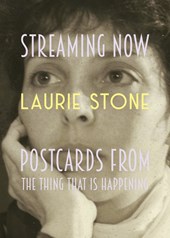Streaming Now: Postcards from the Thing That Is Happening
May 05, 2022
Many of us would probably love to forget the yoyo-ing between monotony and madness of the early pandemic's everyday, but I think books like Streaming Now are essential to continue cultivating our consideration for ourselves and others, extending the learning that was thrust into motion in early 2020.
Streaming Now: Postcards from the Thing That Is Happening by Laurie Stone, Dottir Press
Recently I wondered “is post-pandemic socializing just giving each other podcast, TV show, movie, book, and recipe recommendations that neither of you will ever have time for until you die?” And I think Laurie Stone’s Streaming Now is both an affirmation of and a rebuttal to this idea.
Stone writes in the form of postcards, which she describes as having “an atmosphere of missing connection to others and wishing to show them where you have landed.” The format fits well for a book centered on the COVID-19 pandemic, during which I and many others turned to the renewed novelty and intimacy of a handwritten postcard. In contrast to those writings, between two people in the same span of time, Stone’s postcards arrive to us two years later but are still relevant.
In part one, she reports on her world in vignettes of memories and mundane experiences—housework, running errands, and streaming TV shows or movies.
I don’t know why something goes right or wrong in the garden. I fail and succeed in the dark. It will be absurd to pot and maintain as many plants as I will try to save over the winter, but I will try to save them. I miss drinking in a bar and riding the subway. I feel I know you, although I’ve never met you. The wind is rustling.
She also incorporates her opinions on a few news items like Ruth Bader Ginsberg’s passing and Jeffrey Toobin’s indecent exposure scandal, but she mostly lets the content that she streams inform the memories, feelings, and experiences that she shares.
Laurie doesn't restrain her critiques when it comes to movies, TV shows, news stories, and social media. Her commentary is just that: commentary–observations made within the constraints of time, space, and energy amidst uncertainty, stress, and unrest, but with a shrewd, feminist edge. I can see my own melancholic mindset from the early pandemic times reflected in her vignettes, though Stone is able to express herself much more concisely and poetically than I.
She creates a vivid picture of her everyday existence by relating her reality to the themes she sees play out on screen:
There's a scene in the Mars show when one of the astronauts removes a sock and a piece of his heel comes away from his foot and floats up to his face, and he looks at it with horror. That's the way we look just about all the time, seeing the distance we've come from our lives in the Before. I mean the Before without Trump.
But she remains self-aware, empathetic, and loving, too. She shares so much of herself that it is impossible not to feel close to her, to feel like you know her and she knows you, especially if you are also someone who tries to save dying plants in winter, who realizes how indulgent a hug can feel, who looks forward to the beautiful mundanity of watching a fictional character’s life play out in 30 minute to two hour long moments, or even if you are someone who hate-watches shows just to feel something.
Stone rarely conveys emotions, remaining grounded and confident in her opinions while also asking herself and us readers why people act the way we do. It reminds me of the slowness of time during 2020, when boredom could manifest itself in either philosophical meditations or mental unraveling.
So many people are suffering, and they want their suffering to mean something, and the thing I've noticed is a tendency to convert suffering into an opportunity for growth or something like that—to convert suffering into a life experience and say the terrible thing that is happening to them is teaching them something and enlarging their lives. To set themselves up as a model for others to follow? To believe nothing bad is all bad? I don't want to hurt the feelings of anyone portraying their suffering this way, but it comes off like another formula for rightfeeling and coercive positivity.
In part two of the book, Stone shifts away from postcards and to more thorough pieces about a mixed bag of subjects: 9/11, Kathy Acker and Chris Kraus, the end of a friendship, her brief but intense experience as a caterer, and more. All these stories overlap in ways that reveal something about Stone’s relationships and her relationship to relationships, and that maybe one of her strongest relationships is the one she has with her readers.
This is not a story about making lemonade pie from lemons. This is not a story about lemons. Everything I do is stirred by a frisson of exile and aloneness because that is who I am. It’s neither okay nor not okay. It just is.
Many of us would probably love to forget the yoyo-ing between monotony and madness of the early pandemic's everyday, but I think books like Streaming Now are essential to continue cultivating our consideration for ourselves and others, extending the learning that was thrust into motion in early 2020.
I've been reading some paragraphs twice, trying to figure out what I like so much about them. It might be the way she starts a paragraph with a pithy statement sentence, childlike and straightforward in its observation—”Yesterday I ate two kinds of cake.” Or one that is decidedly darker—”I wake up early in order to live longer.” It might be how the very short paragraphs twist from sentence to sentence, often ending somewhere unexpected. Or how she can condense threads of thought that could easily unspool into a crisis, offering a cautious amount of philosophical musing mixed in with more focused, fleshed-out commentary on streamable content.
Sure, reading the book gave me a ton of (excess) movie and show recommendations on top of interesting commentary on a few I’ve watched already (Are you also excited for season 2 of Hacks?), but Stone also made me feel a little more at ease in my unease and sometimes jaded questioning of the world. Maybe we’ve become too detached from that era of extreme detachment. Maybe the answer to connection is acknowledging our isolation. In Streaming Now, Stone gives herself and us readers space to think, complain, scorn, wonder, celebrate, and mourn. And that is exactly what we all need as we continue to recover, learn, and change.




